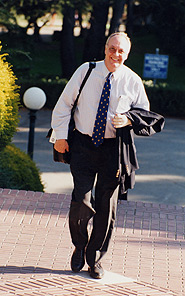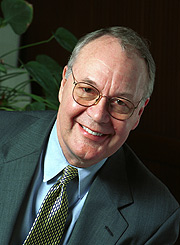Berkeleyan
Former Chancellor Berdahl returns (briefly) to Berkeley
Later this spring, he'll assume helm of higher-ed advocacy org in D.C.
![]()
| 12 January 2006
 Robert Berdahl's plan to return to "the pleasures of teaching and scholarship" has turned out to be short-lived, as he prepares to assume the presidency of the Association of American Universities. |
The Rose Bowl, though, was only a football game. Its high-stakes, real-world parallel took place last week when Berdahl, in what he calls "a fairly fast process of decision-making," accepted an offer to head the Association of American Universities in Washington, D.C.
Similarly mixed feelings attach to his new job as president of the AAU, which he'll begin later this spring after a semester-long return to the Berkeley campus, this time as a faculty member. In October 2003, when he announced his intention to step down as chancellor the following June, he expressed a desire "to return to my academic roots and to the pleasures of teaching and scholarship." He has been on administrative leave since late 2004.
Speaking by phone from his home in Oregon, Berdahl, 68, says he's still looking forward to teaching again - albeit with some trepidation - but that the chance to lead the century-old AAU was too good to pass up, notwithstanding the lure of the classroom.
"I am sacrificing that, and I regret that," he says. "And I may regret it even more as the semester wears on, and I get really deeply involved in teaching."
On the other hand, he believes this is "a critical moment for higher education," and is eager to make the case for America's research universities in the nation's capital.
"Obviously I was torn. It's just that this presented an opportunity - I ultimately felt I had one more job left in me in terms of leadership," Berdahl explains. "And I have to say this is very different from leading a university. The wear and tear of being a university president or chancellor is very high - it's a seven-day-a-week job, it's evenings, very, very long work weeks. I would never have considered going anywhere else as a chancellor or president."
Leading the AAU, he adds, is "a simpler job" than running a campus. "I mean, how can it be difficult? You don't have students, you don't have faculty, you don't have alumni, you don't have football."
Not directly, at any rate. Founded in 1900, the AAU represents 60 U.S. and two Canadian research universities with a combined 1 million undergraduate and 450,000 graduate and professional students. According to its mission statement, the organization "assists members in developing national policy positions on issues that relate to academic research and graduate and professional education." In contrast to the sprawling bureaucracy Berdahl oversaw as chancellor, the AAU has a mere 21 professional and administrative staff.
As Berdahl sees it, one of his biggest tasks as AAU president will be to raise Americans' awareness - "and most particularly within the Beltway" - of research universities' importance to the nation's future, and of the growing competition from abroad on both the economic and academic fronts.
Along with neighbors like Singapore and Korea, China "is investing heavily in building research universities, and aspires to have universities on a par with those in the United States," Berdahl observes. "Our monopoly on graduate education in the world is under challenge."
 Robert Berdahl (Peg Skorpinski photo) |
Such competition, in tandem with national-security measures arising from 9/11 that include tighter visa requirements, has led to "a decline in foreign graduate students coming into the United States, and thus a decline in the infusion of new blood into the mainstream of American research and technological development."
That new blood, he points out, increasingly is going elsewhere. "Australia is just cleaning up. I think it's really unfortunate," he says, bemoaning federal restrictions on foreign-born grad students doing research in U.S. labs. "The notion that this is dangerous for the country, I think, has been disproven by history, because they've contributed enormously to research development in the United States."
Foreign-born researchers, he adds, "end up being some of our best friends abroad. The most pro-American people in the world are those that have studied in the United States."
Another key issue for Berdahl is "the growing gap between the publics and the privates." The AAU's membership embraces both private and public universities - including Berkeley, a charter member, and five other UC campuses - and "if you think about the issues with which AAU is concerned, graduate education and research in particular, they still have much more in common than not. But the ability to sustain public institutions is clearly a particular concern of mine, and I will undoubtedly continue to speak out on that issue."
Asked about the recent San Francisco Chronicle series on what it characterized as lavish compensation packages for top administrators in the UC system - packages UC officials maintain are necessary in order to stay competitive with better-funded private universities - Berdahl, one of the series' targets, insists that UC salaries lag even other public universities that are "not at all on a par with Berkeley."
"You can simply look at stuff in the Chronicle of Higher Education about executive compensation - we're not really off the charts by any means. But it's hard to persuade people of that when you've got a newspaper that wants to scandalize everything," he says. "Now that isn't to say that I feel we're underpaid. I don't think so. I never felt underpaid as chancellor. But I didn't feel overpaid, either."
He also recognizes that faculty and staff have seen their salaries erode, and believes "we should look at the issue of how many multiples an executive salary is of a faculty salary, for example. Is it four or five multiples; is it one and a half? What is the appropriate level of compensation vis-à-vis what a faculty member is paid?"
And though he says that California's "is still one of the best-funded university systems in the country" in terms of state support, he advocates reforming tuition policies to better ensure an education for anyone who wants one. "The wise policy for the country, though it's not one that the country is likely to follow, is a relatively high-tuition, high-financial-aid policy - financial aid based on need," he explains. "We're going to have to see that the support for students is there so that nobody is excluded on the basis of financial need. At the same time, I don't know that we should be subsidizing terribly heavily the educations of people who can afford easily to pay more for them."
Because financial-aid policies are set on a state-by-state basis, however, "I don't think the AAU is in a position to be able to change that a whole lot, except to advertise the problem."
If Berdahl is thinking globally, for the next four months, at least, he'll be acting locally - teaching a freshman seminar he began as chancellor on the history of the university, as well as a new graduate-level seminar, "Examining the Public Realm," that will deal with the privatization of public goods. He's also exploring possible projects with the Center for the Study of Higher Education.
"I'm a little scared about it," he says of the prospect of teaching again. "You don't know if it's like riding a bicycle or not."
As for the move to the AAU, he says, "I didn't plan on it. This came up quite suddenly and quite recently. . It just felt right."

